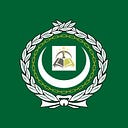Qatar special forces join the Turkish Mercenaries of Libya
The controversial and sinister Qatari Special Forces officer Hamad al-Marri, who is wanted on charges of terrorism by the Artab Quartet, has resurfaced in the capital Tripoli when he entered Tripoli for the first time in 2011 to overthrow Muammar Gaddafi. However, today, he is a visitor through the offices of the Government of National Accord (GNA) and Turkey.
Although his name and identity were not announced to the media as being part of the delegation, Al-Marsad managed to identify Qatar’s Hamad al-Marri whose full name is Hamad Abdullah bin Fatees al-Marri from the photos of the delegation that accompanied the Qatari Defense Minister to Tripoli, Khalid al-Attiyah — despite wearing a military uniform and covering half of his face with a military cap.
Qatar’s Hamad al-Marri sitting near Qatari Defense Minister to Tripoli, Khalid al-Attiyah at the meeting at Al-Mahary Hotel in the present of the State Council’s Khaled Al-Mishri.
Al-Marri appeared in these pictures during a meeting of the Qatari and Turkish defense ministers with the Head of the High Council of the State, Khaled al-Mishri, at Al-Mahary Hotel, accompanied by the Undersecretary of the GNA’s Ministry of Defense, Salah al-Din al-Namroush.
WHO IS HAMAD AL-MARRI?
Hamad al-Marri was the Qatari officer responsible for the joint Qatari Special Forces, both arming and conducting special operations in Libya in 2011. He was also closely associated with the Emir of the Libyan Islamic Fighting Group (LIFG), Abdel-Hakim Belhaj (also known as Abu Abdullah al-Sadiq), whom he brought to the Bab al-Aziziyah camp on 20 August 2011, as shown in this footage. Al-Marri was later promoted as a reward for his work in Libya with the Islamist insurgents.
At the time, the Qataris showcased Belhaj as the “liberating commander” of Tripoli which aroused the discontent of many revolutionaries, especially the Zintan fighters who knew that Belhaj did not deserve such credit and the completely false publicity given to him by Al Jazeera and various other Islamist networks. The Zintanis were suspicious of the media campaign around Belhaj and as the Libya revolution progressed they were proved right.
One of those who was suspicious of Qatar’s intentions and its role at the time was Osama al-Juwaili who, ironically enough, today was among those who received the Qatari and Turkish delegations that includes al-Marri at Mitiga airport in Tripoli. Some leaders from the Zintan and other cities, and even from the former Transitional Council, its executive office, and even the former regime, accused al-Marri and Belhaj of stealing the Libyan state security archive.
Moreover, al-Marri on the day of the entry into Tripoli in 2011 was carrying his weapon when he reopened the Qatari embassy in Tripoli with other officers of the Qatari forces. Furthermore, he placed the Qatari flag on the monument of the US raid in 1986 located in the headquarters in Bab al-Aziziyah in such a insulting and provocative manner, the footage of which Libyans have never forgotten or forgiven.
جدل فى #تونس بعد تصريحات الحرباوي عن هوية الجربوعي الذي إتهمه المسماري بتمويل عمليات فى ليبيا . #المرصد
— صحيفة المرصد الليبية (@ObservatoryLY)
Al-Marri is also accused in Tunisia of opening suspicious bank accounts to carry out sabotage operations and pay bribes. Since 2017, Tunisia has placed his name on the lists of those banned from entering its territory according to a Tunisian parliamentary investigation.
The Qatari opposition describes al-Marri as the “thug” of the Special Forces and the arm of the Emiri Diwan for secret operations, including funding in various such as Syria through his dealings and support for al-Nusra Front as admitted by Qatar.
Al-Marri also played a prominent role in supporting Operation Libya Dawn with money and weapons, as well as the collapsed Shura Councils in Benghazi and Derna. He is also on the terrorist lists issued by the Arab Quartet on charges of secret communication with the Houthi militia in Yemen, which led to the killing of Arab soldiers while Qatar was part of the Coalition to Support Legitimacy in Yemen before its withdrawal therefrom and later siding with the Houthis and Iran.
